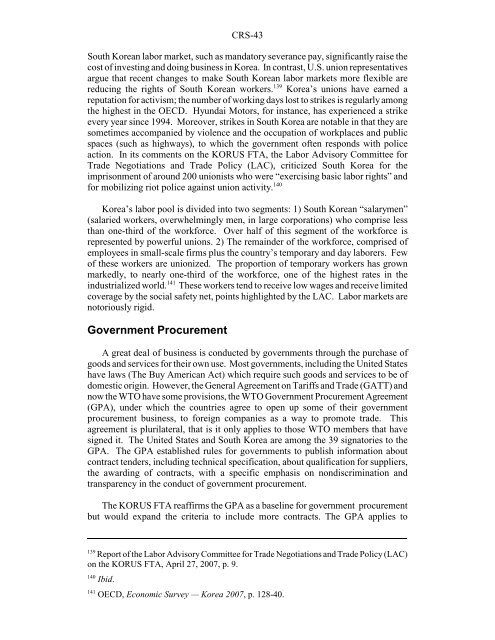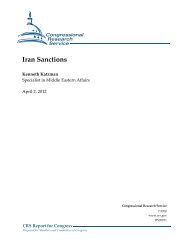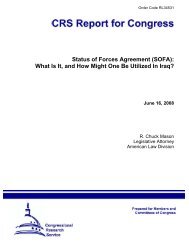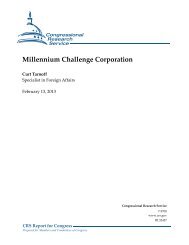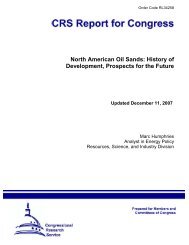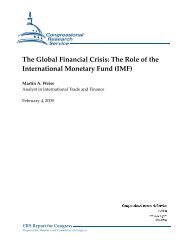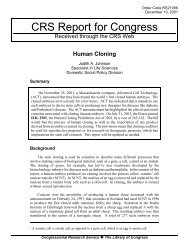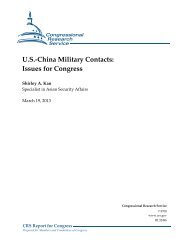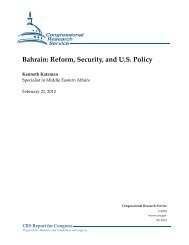The Proposed U.S.-South Korea Free Trade Agreement (KORUS ...
The Proposed U.S.-South Korea Free Trade Agreement (KORUS ...
The Proposed U.S.-South Korea Free Trade Agreement (KORUS ...
- TAGS
- korea
- fpc.state.gov
Create successful ePaper yourself
Turn your PDF publications into a flip-book with our unique Google optimized e-Paper software.
CRS-43<br />
<strong>South</strong> <strong>Korea</strong>n labor market, such as mandatory severance pay, significantly raise the<br />
cost of investing and doing business in <strong>Korea</strong>. In contrast, U.S. union representatives<br />
argue that recent changes to make <strong>South</strong> <strong>Korea</strong>n labor markets more flexible are<br />
reducing the rights of <strong>South</strong> <strong>Korea</strong>n workers. 139 <strong>Korea</strong>’s unions have earned a<br />
reputation for activism; the number of working days lost to strikes is regularly among<br />
the highest in the OECD. Hyundai Motors, for instance, has experienced a strike<br />
every year since 1994. Moreover, strikes in <strong>South</strong> <strong>Korea</strong> are notable in that they are<br />
sometimes accompanied by violence and the occupation of workplaces and public<br />
spaces (such as highways), to which the government often responds with police<br />
action. In its comments on the <strong>KORUS</strong> FTA, the Labor Advisory Committee for<br />
<strong>Trade</strong> Negotiations and <strong>Trade</strong> Policy (LAC), criticized <strong>South</strong> <strong>Korea</strong> for the<br />
imprisonment of around 200 unionists who were “exercising basic labor rights” and<br />
for mobilizing riot police against union activity. 140<br />
<strong>Korea</strong>’s labor pool is divided into two segments: 1) <strong>South</strong> <strong>Korea</strong>n “salarymen”<br />
(salaried workers, overwhelmingly men, in large corporations) who comprise less<br />
than one-third of the workforce. Over half of this segment of the workforce is<br />
represented by powerful unions. 2) <strong>The</strong> remainder of the workforce, comprised of<br />
employees in small-scale firms plus the country’s temporary and day laborers. Few<br />
of these workers are unionized. <strong>The</strong> proportion of temporary workers has grown<br />
markedly, to nearly one-third of the workforce, one of the highest rates in the<br />
industrialized world. 141 <strong>The</strong>se workers tend to receive low wages and receive limited<br />
coverage by the social safety net, points highlighted by the LAC. Labor markets are<br />
notoriously rigid.<br />
Government Procurement<br />
A great deal of business is conducted by governments through the purchase of<br />
goods and services for their own use. Most governments, including the United States<br />
have laws (<strong>The</strong> Buy American Act) which require such goods and services to be of<br />
domestic origin. However, the General <strong>Agreement</strong> on Tariffs and <strong>Trade</strong> (GATT) and<br />
now the WTO have some provisions, the WTO Government Procurement <strong>Agreement</strong><br />
(GPA), under which the countries agree to open up some of their government<br />
procurement business, to foreign companies as a way to promote trade. This<br />
agreement is plurilateral, that is it only applies to those WTO members that have<br />
signed it. <strong>The</strong> United States and <strong>South</strong> <strong>Korea</strong> are among the 39 signatories to the<br />
GPA. <strong>The</strong> GPA established rules for governments to publish information about<br />
contract tenders, including technical specification, about qualification for suppliers,<br />
the awarding of contracts, with a specific emphasis on nondiscrimination and<br />
transparency in the conduct of government procurement.<br />
<strong>The</strong> <strong>KORUS</strong> FTA reaffirms the GPA as a baseline for government procurement<br />
but would expand the criteria to include more contracts. <strong>The</strong> GPA applies to<br />
139 Report of the Labor Advisory Committee for <strong>Trade</strong> Negotiations and <strong>Trade</strong> Policy (LAC)<br />
on the <strong>KORUS</strong> FTA, April 27, 2007, p. 9.<br />
140 Ibid.<br />
141 OECD, Economic Survey — <strong>Korea</strong> 2007, p. 128-40.


